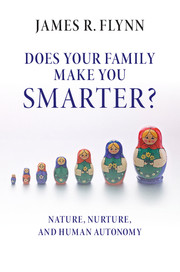Book contents
- Frontmatter
- Dedication
- Epigraph
- Contents
- List of figures, tables and boxes
- Acknowledgments
- Part I Human autonomy
- Part II Intelligence
- 7 The Raven's revolution
- 8 Learning from astronomy
- 9 The meta-theory of intelligence
- 10 Scientific theories of intelligence
- 11 Psychology and Cardinal Bellarmine
- For scholars who wish to use the Age-Table Method to measure family effects in nations other than the USA
- Appendix I Wechsler Vocabulary and description of method of analysis
- Appendix II Stanford-Binet Vocabulary
- Appendix III Raven's Progressive Matrices
- References
- Name index
- Subject index
9 - The meta-theory of intelligence
from Part II - Intelligence
Published online by Cambridge University Press: 05 June 2016
- Frontmatter
- Dedication
- Epigraph
- Contents
- List of figures, tables and boxes
- Acknowledgments
- Part I Human autonomy
- Part II Intelligence
- 7 The Raven's revolution
- 8 Learning from astronomy
- 9 The meta-theory of intelligence
- 10 Scientific theories of intelligence
- 11 Psychology and Cardinal Bellarmine
- For scholars who wish to use the Age-Table Method to measure family effects in nations other than the USA
- Appendix I Wechsler Vocabulary and description of method of analysis
- Appendix II Stanford-Binet Vocabulary
- Appendix III Raven's Progressive Matrices
- References
- Name index
- Subject index
Summary
Questions
(1) What role do heuristics or quasi-heuristics play in the study of intelligence?
(2) How do heuristics leave room for evidence – that is, permit a variety of scientific theories free to compete with one another?
About 100 years ago, beginning with the testing of army recruits in 1917 in America, psychologists began to collect data that could be used to test theories of intelligence. They used the Stanford-Binet of 1916 and other tests that were the forerunners of Wechsler's IQ tests. These tests are an implicit response to a heuristic that has given advice to theory builders from that time to the present.
The heuristic of intelligence
I will summarize the content of that heuristic (for a full statement, see Flynn, 2009, pp. 53–4). It emphasizes the following traits.
Mental acuity: the ability to solve on-the-spot problems we have never encountered before. The problems deemed important vary, of course, from society to society.
Habits of mind: for example, the extent to which people are accustomed to use logic to analyze problems, and to deal with symbols increasingly detached from the concrete world.
Vocabulary, knowledge (including mathematics in our culture), and information: the more you have, the wider the range of problems you can attack.
Speed of information processing: the quicker one can assimilate data the better, particularly if problems must be solved within a time limit.
Rote memory and working memory: the larger the amount of relevant information (and conceptual rules) you can keep in mind, the better equipped you are to arrive at a solution.
Note that the whole content of this heuristic is cross-cultural in the sense that other societies prioritize problems unlike ourselves: Australian aborigines put mapping skills (to find water) well above the skill of using logic on abstractions so useful in formal education.
Wechsler thought within the context of modern Western society. He did not construct a theory of intelligence. He made fun of the Stanford-Binet for the cutting lines it used to separate levels of mental ability: gifted, high normal, low normal, mentally retarded. He noted that the scores all ended exactly in zero and said that this was astronomically improbable. All of Wechsler's new cutting lines ended in exact multiples of standard deviations, which was no less improbable.
- Type
- Chapter
- Information
- Does your Family Make You Smarter?Nature, Nurture, and Human Autonomy, pp. 107 - 128Publisher: Cambridge University PressPrint publication year: 2016



